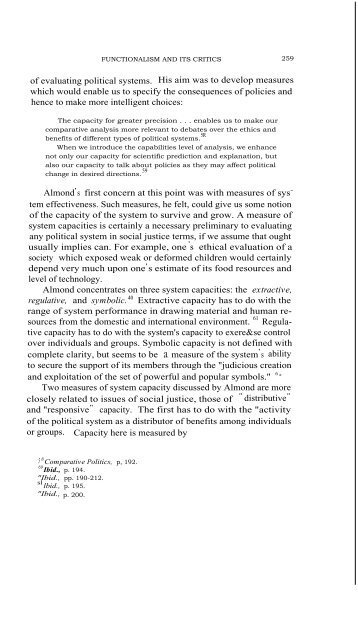FUNCTIONALISM AND ITS CRITICS - Intercollegiate Studies Institute
FUNCTIONALISM AND ITS CRITICS - Intercollegiate Studies Institute
FUNCTIONALISM AND ITS CRITICS - Intercollegiate Studies Institute
You also want an ePaper? Increase the reach of your titles
YUMPU automatically turns print PDFs into web optimized ePapers that Google loves.
<strong>FUNCTIONALISM</strong> <strong>AND</strong> <strong>ITS</strong> <strong>CRITICS</strong><br />
of evaluating political systems. His aim was to develop measures<br />
which would enable us to specify the consequences of policies and<br />
hence to make more intelligent choices:<br />
The capacity for greater precision . . . enables us to make our<br />
comparative analysis more relevant to debates over the ethics and<br />
benefits of different types of political systems. 5R<br />
When we introduce the capabilities level of analysis, we enhance<br />
not only our capacity for scientific prediction and explanation, but<br />
also our capacity to talk about policies as they may affect political<br />
change in desired directions. 59<br />
Almond ' s first concern at this point was with measures of sys -<br />
tem effectiveness. Such measures, he felt, could give us some notion<br />
of the capacity of the system to survive and grow. A measure of<br />
system capacities is certainly a necessary preliminary to evaluating<br />
any political system in social justice terms, if we assume that ought<br />
usually implies can. For example, one ' s ethical evaluation of a<br />
society which exposed weak or deformed children would certainly<br />
depend very much upon one ' s estimate of its food resources and<br />
level of technology.<br />
Almond concentrates on three system capacities: the extractive,<br />
regulative, and symbolic. 40 Extractive capacity has to do with the<br />
range of system performance in drawing material and human resources<br />
from the domestic and international environment. 61 Regulative<br />
capacity has to do with the system's capacity to exere&se control<br />
over individuals and groups. Symbolic capacity is not defined with<br />
complete clarity, but seems to be a measure of the system ' s ability<br />
to secure the support of its members through the "judicious creation<br />
and exploitation of the set of powerful and popular symbols." 6 2<br />
Two measures of system capacity discussed by Almond are more<br />
closely related to issues of social justice, those of " distributive "<br />
and "responsive " capacity. The first has to do with the "activity<br />
of the political system as a distributor of benefits among individuals<br />
or groups. Capacity here is measured by<br />
5 8 Comparative Politics, p, 192.<br />
69 Ibid., p. 194.<br />
"Ibid., pp. 190-212.<br />
sl lbid., p. 195.<br />
"Ibid., p. 200.<br />
259
















